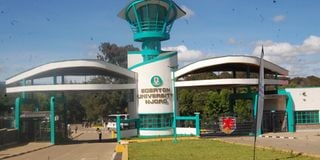Reprieve for Egerton University engineering graduates

The entrance of Egerton University’s Njoro campus.
More than 200 graduates from Egerton University who studied for an unaccredited engineering degree will be offered eight remedial courses at no extra cost in order to qualify to practise, following the intervention of Parliament.
The students who have been jobless because they cannot be registered by the Engineers Board of Kenya (EBK) will take the extra courses from September in order to qualify for the registration. The affected are graduates of Bachelor of Science, Water and Environmental Engineering, which was introduced by the university in 2014. The course is not accredited by the Commission for University Education (CUE).
The Research and Education Committee of the National Assembly adopted recommendations that the university begins the remedial courses in two months’ time to make up for the loss.
“The schedule of offering the remedial courses should start in September 2022 and concludes latest by December 2024 through a planned schedule,” reads the report by the committee chaired by Busia MP Florence Mutua.
Committee findings
This followed findings by the committee that Egerton University did not obtain the requisite approval from CUE before introducing the BSc, Water and Environmental Engineering and that it lacked the necessary equipment for the training when it launched the course in 2014.
After the remedial courses, the students will be eligible to graduate with a BSc, Civil and Environmental Engineering degree.
The university has made arrangements for three special semesters for the students to cover the eight courses in order to save time.
The university also failed to consult the EBK for advice to ensure that the course meets the standards as set out by the board. As a result, graduates of the programme could not be registered to practise as engineers and have missed employment opportunities.
“Further, it is a waste of resources for parents and students thus negatively affects the economy,” the report reads.
The findings follow a petition to Parliament by a group of aggrieved students from Egerton University – David Olumasai, Ian Gicobi and Elvin Mangeni – who graduated in 2019 to be facilitated to study and acquire an accredited degree.
Alternatively, they asked to be paid Sh750,000 each by the university to enable them to upgrade to an EBK-accredited civil engineering course from another university. They also wanted the university stopped from enrolling more students into the programme.
CUE inspection
According to the Universities Act (2012), before a university launches a new academic programme, it should invite CUE to conduct an inspection and evaluation of the institution regarding its physical, human, library and financial resources and relevant curriculum content, among other requirements. The Act also provides for consultation with other relevant bodies that regulate a particular profession.
The process involves an in-depth review and assessment of a programme to ensure compliance with the standards set by EBK. The board assesses the programme design, curriculum content, faculty staff establishment, the institution’s training facilities and infrastructure, training duration and quality assurance.
The MPs also found that the university offers other programmes which had not been approved by EBK as of March this year. These are Bachelor of Science Electrical and Control Engineering, Bachelor of Science, Civil and Structural Engineering, Bachelor of Science, Mechanical Engineering and Technology as well as Bachelor of Science Mechanical and Manufacturing.
“Graduates from such courses cannot therefore be accredited by EBK to practise engineering,” noted the MPs.
“CUE should undertake regular inspections, monitoring and evaluation of universities and ensure compliance with the provisions of the Universities Act and Regulations relating to approval and accreditation of academic programmes,” recommended the legislators.
They further instructed the Kenya Universities and Colleges Central Placement Service to check the approval and accreditation status of institutions that apply for placement of government-sponsored students. “It must be approved by CUE and the respective professional regulatory body.”
During the hearing of submissions to the committee in March, it emerged that there are about 25 engineering courses in various universities that are not recognised by EBK.





